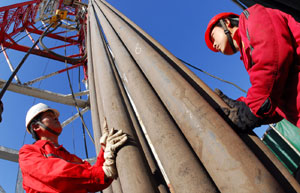Opinion
Curbing price hikes
(China Daily)
Updated: 2010-11-18 14:22
 |
Large Medium Small |
Premier Wen Jiabao's latest vow to suppress sharp rises in commodity prices that affect people's immediate interests highlighted the increasing urgency of fighting soaring inflation.
Some administrative intervention, such as setting a price ceiling to regulate the market, may soon be rolled out to curb price hikes. But to prevent overall inflation from running out of control, Chinese policymakers must take much bolder actions to turn off the liquidity tap.
After the prices of 18 staple vegetables were reported to have risen 62.4 percent across the country during the first 10 days of this month, compared to a year earlier, Premier Wen urged local governments to guarantee supplies of daily food and other necessities, so as to maintain market order.
Such a high-profile call for renewed efforts to battle inflation is much needed to disperse any statistical illusion arising from the "so-far-so-good" consumer price index (CPI).
According to official statistics, from January to October, China's CPI rose just 3 percent year-on-year, hitting the government's ceiling target for the year. But the mounting price pressures that Chinese consumers are feeling suggests that the current CPI is a far from effective gauge of inflation.
However, it doesn't help to blame the statistics for losing touch with reality at a time when such a sharp upswing in food prices is already happening. The statisticians simply cannot update their complex methodology overnight to measure the price trend more accurately. Nevertheless, an improvement in statistical work would make a difference in helping policymakers to identify the problems and fix them.
Premier Wen's remarks on fighting inflation show that the government has realized the severity of this round of inflation. It is certain that administrative measures to curb excessive increases in the prices of food and necessities will bear some immediate fruits in maintaining market order. But, the more demanding task is to address the underlying driving force behind soaring inflation.
China's central bank has not only frequently raised bank reserve requirements but also hiked interest rates for the first time in three years in order to soak up excess liquidity. But both the negative deposit interest rate at home and the inflow of hot money driven by rich countries' super loose monetary policies make it necessary to tighten domestic credit supply more resolutely to tame inflation.
 Shale gas lures oil majors
Shale gas lures oil majors


